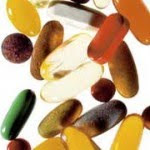
As you may have noticed, in the last couple of years there has been alot of talk about the toxic chemicals and synthetic ingredients found in cosmetic products. While its horrible to know that these nasties have been hiding in our bathroom cabinets for yonks, its also great to know that now there are so many alternative, safe brands coming out into the spotlight, such as lavera makeup, santorini self tan, nude by nature, atlantis watercolour hair dye, the list goes on and will hopefully continue to do so (yippee!). Ive noticed though that there has not been too much talk about nail polish, and the toxic chemicals lurking in those pretty little bottles.... What are they? What do they do? Are polishes just as good without them? Who makes polishes free of these chemicals ('the Big 3')?
'What are the Big 3 toxic chemicals?
What do they do?
Dibutyl Phthalate (DBP) is a plasticiser to prevent chips and cracks. DBP is an oily liquid that is soluble in fat and slightly soluble in water. It is not very volatile so it does not evaporate readily into the atmosphere. Over 75% of DBP is used as a plasticiser in polymers such as PVC, 14% is used in adhesives, 7% in printing inks and 3% in other miscellaneous uses, including sealants and grouting agents used in construction as well as consumer products such as cosmetics.
Formaldehyde is used in some nail hardeners. It is a resin, making the polish tough and resilient. While the resin is manufactured from formaldehyde, once the product becomes a resin, the formaldehyde is chemically changed and essentially no longer present. So while formaldehyde is grouped in with toluene and DBP in marketing statements and considered one of the Big 3, it isn’t actually an issue unless you have a reaction to the formaldehyde resin. The bottom line, you should be aware of formaldehyde in your treatment products, not polish.
Toluene is a solvent that makes the polish easy to apply, and is commonly used as an industrial solvent for the manufacturing of paints, chemicals, pharmaceuticals, and rubber. Toluene is found in gasoline, acrylic paints, varnishes, lacquers, paint thinners, adhesives, glues, rubber cement, airplane glue, and shoe polish. At room temperature, toluene is a colorless, sweet smelling, volatile liquid.
So, Why are they bad?
There are risks and effects caused by exposure to each of these chemicals. But, whether or not limited exposure to polish will actually result in those effects is yet to be determined....but lets check em out; Toluene is a human reproductive toxin. Formaldehyde is a carcinogen that has been shown to cause cancer in lab animals. Dibutyl Phthalate is a chemical used in making plastics. It is known to cause infertility, as well as uterine problems in women and testicular cancer in men. Dibutyl Phthalate is one of the most toxic chemicals to the human body, and most cosmetic companies are discontinuing it’s use. Pregnant women should be especially careful to avoid the use of dibutyl phthalate because it has been shown to harm a developing male fetus. It is up to all of us to be educated about the chemicals we use in and on our bodies.
"Women of reproductive age should avoid using certain nail polishes, perfumes, and hair sprays containing an ingredient known to cause lifelong reproductive impairments in male rats,
The Environmental Working Group, an environmental advocacy group, is cautioning.
The ingredients in question are dibutyl phthalates (DBP) industrial chemicals that are used as plastic softeners and solvents in a wide variety of products such as:
Nail Polish, Perfume, Hair Spray, Toys, Detergents, and Food packages. The warning was based in large part on a recently completed CDC study (
Environ Health Perspect 2000 Oct;108:972-82) , in which the investigators found levels of the metabolized compound in women of childbearing age.
"Women of reproductive age (20-40 years) were found to have significantly higher levels of monobutyl phthalate, a reproductive and developmental toxicant in rodents, than other age/gender groups. From a public health perspective, these data provide evidence that phthalate exposure is both higher and more common than previously suspected," the CDC investigators wrote.
The investigators also speculated that the higher levels in women of reproductive age were due to the use of cosmetics such as perfume, nail polishes, and hair sprays. The extensive use of these products among women is probably leading to the inhalation and absorption of this chemical through the lungs, the investigators said.
The report from the Environmental Working Group (EWG) (LINK) entitled "Beauty Secrets" suggests that the substance may be responsible for the following problems, which have increased during the 1970s and '80s:
Declining sperm counts, Increase in sexual deformities, and an increase in testicular cancer.
The EWG says that getting any immediate regulatory action passed is virtually impossible, due to the fact that the associations are difficult to impossible to prove. Under the current regulations, the responsibility of proving that there is a public health threat from cosmetics primarily falls upon US health authorities rather than the manufacturers".
Concerned? I know I am. But freet not, because we have good news! Come November, we will be stocking
'Butter London' nail polishes and treatment products, which are
Big 3 Free, and wont set you back anymore than a normal cosmetic brand nail polish! Check out all the colours (below)





 Keep Cups - in small, medium or large....depending on how thirsty you are!
Keep Cups - in small, medium or large....depending on how thirsty you are! Every Man Jack - Natural Skin care for the guys!
Every Man Jack - Natural Skin care for the guys! Natures Sunshine 14 Day Detox - contains enough for 2 people for 14 days, a great present for the health concious couple!!
Natures Sunshine 14 Day Detox - contains enough for 2 people for 14 days, a great present for the health concious couple!! 


 Nattokinase
Nattokinase





































